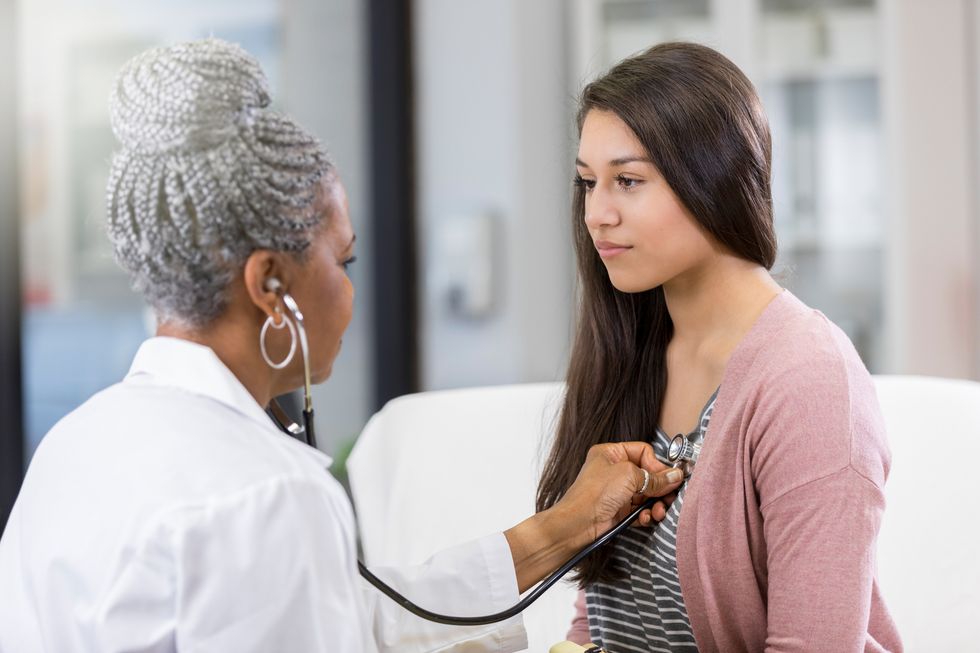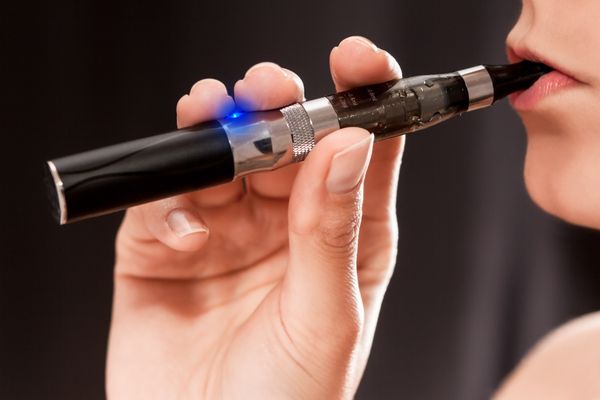Just like small kids and adults need annual checkups, so do those in the middle—teens. Regular checkups are important to ensure that all aspects of physical and mental health throughout the teenage years are up to par. After all, healthy teenage years pave the way for healthy living as an adult.
Before the onset of puberty, all preteens and their parents should discuss any questions and concerns they have about puberty as part of an annual wellness checkup. These conversations usually start around age 11; however, depending on your health care professional and your child's maturity level, conversations surrounding puberty may start earlier. This appointment is also an opportunity for you to gather printed material on a variety of health issues you and your teen can review together, including the menstrual cycle, contraception and sexually transmitted diseases (STDs). A gynecological (pelvic) examination is usually not a part of this visit. However, your teen should be tested for sexually transmitted diseases (STDs) if she has had sex within the past three years.
Another aspect of teen health your provider will address at these checkups are vaccinations. Guidelines suggest women age 11 to 18 get the following vaccines:
Tetanus–diphtheria–pertussis (Tdap) booster
Human papillomavirus vaccine
Meningococcal vaccine
Influenza vaccine (yearly)
In addition to routine vaccines, some young women who are at an increased risk for certain diseases may get additional immunizations, including hepatitis A and the pneumococcal vaccine. Discuss the risks and benefits of these vaccines with your health care professional.
A Right of Female Passage: The First Pelvic Exam
According to the American College of Obstetricians and Gynecologists (ACOG), women should have their first gynecologic visit between the ages of 13 and 15. They should have a pelvic exam and pap smear about three years after they become sexually active, or by the age of 21. A woman may need to have a pelvic exam before that if she has any health problems with her vagina, uterus or ovaries. And these days, many health care professionals recommend that young women be seen before their first sexual experiences. This way, they can provide young female patients with information about abstinence, contraception and STDs before they become sexually active.
Health care professionals realize that most young women are nervous and/or embarrassed during their first pelvic exams; the health care professional will most likely talk to your teen about what to expect before the exam. Some young women choose to have their mother or another person they feel comfortable with accompany them on the first few visits.
Depending on a girl's age and whether she's sexually active, a pap test may or may not be part of the annual pelvic exam. A pap test examines the cervix for the presence of any abnormal cells that could be early signs of cancer. The American Cancer Society agrees with ACOG and recommends girls and women have a Pap test about three years after they become sexually active, but no later than age 21. These tests should continue annually until she reaches age 30. A health care professional may use a traditional Pap test or a liquid-based Pap test.
After age 30, if a woman has had three normal tests in a row, she may be able to wait for three years before having another test. Health care professionals can offer guidance on when to schedule the next Pap test.
What your teen can expect with her first Pap test:
Most teenage girls are nervous about their first Pap test. As such, the better you can prepare her for what she can expect, the more comfortable she will feel. Share this description with your teen and use it as a spring board for any questions she might have:
In an examination room, with the patient comfortably lying on an examination table, a health care professional will gently insert a small plastic or metal instrument called a speculum into the vagina and lightly brush cells from the cervix. The health care professional will then place the cell sample on a slide or transfer it to a liquid solution and send it to a laboratory, where it will be examined under a microscope for abnormalities in the cell structure.
If there are any abnormalities, the health care professional may recommend a Pap smear more often than once a year. Abnormalities could be signs of cervical cancer and/or viral infections such as human papillomavirus (HPV).
In addition to a pelvic exam and Pap test, an annual visit may also include a breast exam. If so, the health care professional will examine both breasts for any unusual lumps and other abnormalities such as redness, pain or discharge. He or she will do this both by sight and by touch. Your teen may feel embarrassed during this exam. (Even adult women don't rank Pap tests and breast exams high on their list of fun). Try to reassure her, however, these types of examinations are critical for her health and are part of learning to take good care of herself as she grows older. The health care professional can also teach your teen how to do regular breast self-exams so she can learn to monitor her own body and become aware of any concerning changes.
Remember to tell your daughter that the discussions she has with all her health care professionals are confidential. Some of the topics she may discuss with her health care professional include menstrual problems and general women's health issues including mental health, sexual activity or sexual problems, contraception, preventing and screening for sexually transmitted diseases (STDs) and pregnancy.
Sidebar: What to Ask During Your First Reproductive Health Appointment
To help her get the most out of her first OB/GYN appointment, encourage your teen to make a list of questions that address any concerns she might have about her periods, sexually transmitted diseases, breast health (including soreness) and birth control.
What can I do to be more comfortable during this exam?
How long will the exam take?
How will my privacy be protected? Will you share information about this exam with my parents?
What tests should I take based on my health and sexual history?
Am I developing normally? Is there anything I should be concerned about?
I feel fine, but could I still have a sexually transmitted infection or disease or vaginal infection? What tests can you do to find out?
What can I do about my PMS symptoms? Would birth control pills or an antidepressant help?
What are my birth control options? How do I decide which is best for me?
How can I tell my parents about my decision to use birth control?
If I have sex and then want emergency contraception, what should I do? Can I get a prescription now?
What are some precautions I should take to protect myself from STDs and unwanted pregnancy?
What should I do if I think I'm pregnant?
What are some things I should do to improve my health?
Q and A:
What is an STD?
Sexually transmitted diseases (STDs) are infections most commonly spread through sexual intercourse or genital contact. According to the CDC, in 2017, there were a record-breaking 2.3 new million cases of gonorrhea, chlamydia, and syphilis. Unprotected sex and multiple sex partners place young people at risk for HIV infection, other STDs and pregnancy. If your teen is sexually active, a latex condom is her your best protection against getting an STD. It is important to know how to use a condom properly.
Should my teen have a Pap test?
Your teen should have a Pap test about three years after she becomes sexually active; if she's not having sex, she should have a Pap test by age 21. A Pap test will be done in the health care professional's exam room and only takes a minute or two. The health care professional will insert a speculum into the vagina and lightly swab the cervix. A lab technician will analyze the results, looking for anything abnormal. Abnormalities could be signs of cervical cancer or viral infections such as human papillomavirus (HPV).







